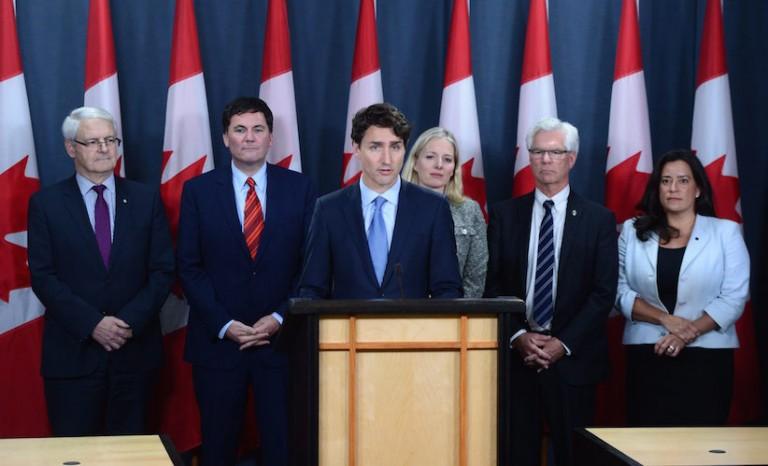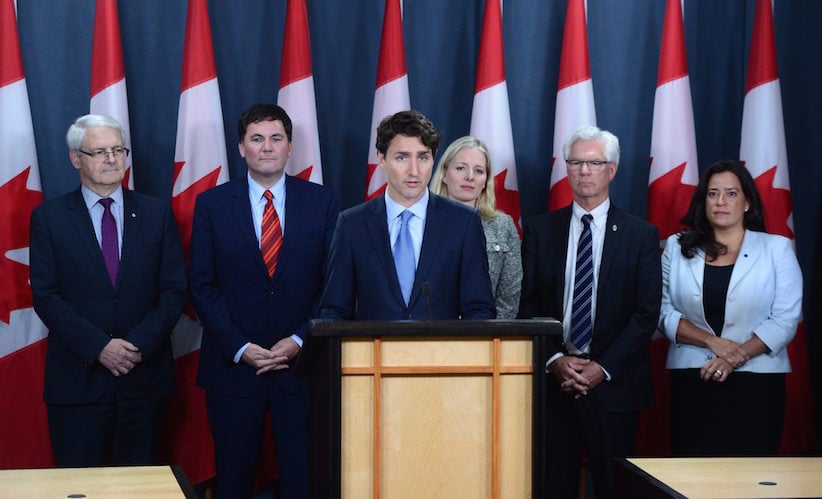Justin Trudeau, Christy Clark and a high-stakes Game of Pipelines
Evan Solomon on what the Liberals can do next to salvage a suddenly imperiled climate plan. Timing will be everything.

Prime Minister Justin Trudeau holds a press conference at the National Press Theatre in Ottawa on Tuesday, Nov. 29, 2016, announcing that his government would approve two pipeline projects. (Sean Kilpatrick/CP)
Share

Pierre Trudeau once said, “the essential ingredient in politics is timing” and right now his son Justin must appreciate that wisdom more than he ever wanted.
Just months ago Prime Minister J. Trudeau’s green version of the New Deal, his great Carbon Pact, was all set to go. A national price on carbon in exchange for the twinning of the Kinder Morgan pipeline. But suddenly, in the blink of an eye, or, more accurately, in the blink of a B.C. election, all this is poised to unravel. Are the Kinder Morgan Pipeline and the Trudeau carbon pact really dead?
Let’s hold off on the eulogies for a moment. While conventional wisdom says the pipeline project is on life support because the next likely government in B.C., a partnership between the NDP and the Greens, is keen on killing it, the B.C. Liberals are not going gently into that good political night.
Instead, Premier Christy Clark is embarking on a fascinating series of tactical retreats that might not only decide the fate of the pipeline and the next government in B.C., but also the fates of Alberta Premier Rachel Notley and maybe, too, of Trudeau. This is Canadian politics as an episode of Game of Thrones. Without the swords. And the sex….Ok, this is not like Game of Thrones at all, but B.C. politics is as close as it gets.
If the NDP’s John Horgan becomes the next premier in a few weeks, he and his new bestie, Green party leader Andrew Weaver, promise to do everything they can to stop the Kinder Morgan pipeline. They don’t want the number of oil tankers in the Burrard inlet to go up sevenfold and they are backing the legal challenges coming from three of the B.C. coastal nations. It’s a cogent argument, backed up by the fact that 57 per cent of people in B.C. voted for the NDP and the Greens. So they have a mandate to reject. What they don’t have is the law.
If he really wants to, Trudeau can invoke section 92 (10)(c), of the Constitution, which gives him the legal jurisdiction to by-pass the province and, for the “general advantage of Canada,” build the pipeline. That the clause has not been invoked for 56 years, and doing so wouldn’t remotely comply with what Trudeau has called a “social licence”—a fashionable, non-legal concept swaddled in political fleece that means popular support for government projects—but still, that’s how the country works.
No one really believes Trudeau will risk the wrath of B.C. and the seats he has there and bully the pipeline through, but it’s a good stick to have in his back pocket. As a devotee to dialogue, Trudeau will undoubtedly deploy his consultation charms on John Horgan in the next few months to move him on side, but there’s already a lot more going than that.
First, Trudeau just ponied up an $860 million bail out package for the softwood lumber industry, which has been devastated by the specious $1 billion tariff the U.S. slapped on the industry. That package came quickly and will likely save jobs in over 130 communities in the interior of B.C. That’s important to note. The interior voted Liberal in the last provincial election, and helping those folks also helps Christy Clark. That was not lost on Trudeau.
After all, the Federal Liberals had already stepped on the scale to try to support Clark, when, in mid-campaign, they sent out a public letter suggesting they would consider her suggestion of retaliating against the U.S. by slapping counter tariff on American thermal coal. A senior federal Liberal told me at the time they believed that gesture alone would bump up support for Clark between 5 and 7 per cent. It turned out not to be enough.
It was a sign, however, of how desperately the federal government wanted Clark to win. Trudeau’s signature policy, the national price on carbon, was contingent on a series of delicate deals. First, Trudeau had to work with the NDP government in Alberta to twin his plan for a national price on carbon with its provincial plan and with its idea to put an emission cap on the oil sands. He sealed the alliance in exchange for green lighting the Kinder Morgan Trans-mountain pipeline. Check. Then, the Liberal government in B.C was brought on board after he gave them a $1.5 billion Ocean Protection Plan. Check. That was supposed to give the PM the social licence to get the pipeline to tide water. So after the National Energy Board’s process approved the project, cabinet gave it the go. Check.
Except, not really. Now what happens?
Tactics. The B.C. Liberals only lost the election by one seat, and while the conventional wisdom in Ottawa is that they lost their majority because of the divisive pipeline issue, B.C. Liberals don’t consider that a major factor. They believe that after so long in power, not only was there a wave of change, they became tone deaf to issues of affordability and early childhood education, issues that resonated in the suburbs around Vancouver and lower main land, where they lost. Even around Burnaby, where the pipeline would terminate, Liberals in B.C. believe the Kinder Morgan issue was way down on most voter’s list, except for the hard core Green supporters, who were against it, and union voters, who are actually for it. So it cut both ways.
That explains why Clark is not stepping down. Instead, she is promising to introduce a Speech from the Throne when she recalls the Legislative Assembly in the next few weeks. Expect her not to retreat one inch from her promise of lower taxes and critically, not to retreat on resource development like the pipeline.
What she will do is step up with massive new promises on early childhood education, child care and other issues of affordability. She will also happily embrace the Greens desire to have a referendum on proportional representation. And just as important, she will likely put forward a much needed and long-overdue campaign donation reform plan, to cut corporate and union donations out of the wild West that is the current campaign territory. It might all come off as cynical, late and self-serving—there is a good case to be made for all of that—but it will force the NDP and the Greens to vote against the most progressive social agenda a Liberal government in B.C. has ever put forward.
Clark still fully expects her government to fall, but the Speech from the Throne will essentially be a campaign document for an election she would like to fight within the next 18 months. Clark won the Harper Conservative vote in the interior, but lost the Trudeau Liberal vote in the suburbs, and she believes she can win it back after a short period in the penalty box.
That’s where it gets even more interesting. Once Clark’s government falls, the NDP and Greens have to walk the razer’s edge in order to survive. Together they have 44 seats to the Liberal’s 43, but they have to put up one MLA as the speaker. That means every vote goes to a tie. Usually the speaker breaks a tie in favour of the government, but if the speaker does this for every vote, how neutral will that speaker really look? The new government’s mandate might start to appear shaky.
The NDP and Greens will fight the pipeline by slowing down issues like permitting and whipping up public support, but they also need to move on the social issues. They can’t make the pipeline their whole identity. Under Weaver, the Green Party has already made some key demands, many of them, like proportional representation and campaign finance reform, are designed to keep them politically relevant for years to come. That’s smart, but still, they have to shake the stereotype that they are a self-serving, one issue party. The Greens need to show they can govern for everyone.
So watch how the next few weeks unfold. The B.C. Liberals are designing a tactical retreat with their Federal cousins in mind, all in hopes of fighting another election as soon as possible, one they hope to win. If they do, Rachel Notley in Alberta will breathe a sigh of relief. If they don’t, Notley knows she will lose the pipeline—more like a political lifeline—and the new, united conservative party in Alberta will be poised to sweep back to power. That would set off a chain reaction. No Notley, no national price on carbon, no pipeline and suddenly Trudeau’s Carbon Pact goes boom.
Trudeau always knew he had small window of time to lock up his national price on carbon and a pipeline. That window of time is closing. That’s why he is now looking for another one in the next 18 months in BC. That will take him perilously close to the next federal election. As ever, the timing will be everything.